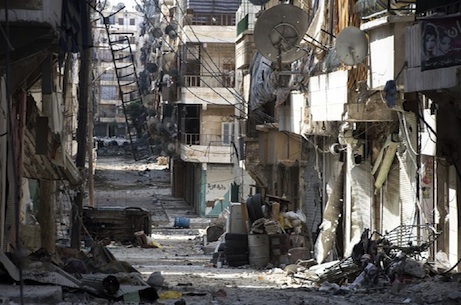
Raphael Lefevre has written the first history of Syria's Muslim Brotherhood.
The exiled Muslim Brotherhood in Syria is preparing to exploit the current crisis in the country to make its return, but is unlikely to link up with the most extreme Islamic militants, according to a forthcoming book written by a Gates Cambridge Scholar.
Ashes of Hama: The Perilous History of Syria’s Muslim Brotherhood, by Raphael Lefevre [2012], is to be published in February 2013 and is the first book to explore the history of this secretive Islamic movement.
Exiled for over 30 years, some of the Brotherhood are now returning Syria under cover. Other members are moving closer to Syria, for instance, to Turkey where they can operate openly in the refugee camps.
“They are preparing for a post-Assad Syria,” says Raphael. “They are rich and well organised and could be a major player in the Syrian conflict in part because the secular opposition is so divided. Islamists in Syria are highly organised because for a long time the mosques have been the only place where public gatherings have been allowed. Friday prayers have been an important focal point.”
The history of the Muslim Brotherhood in Syria is not well known. Crucial is the 1982 Hama massacre, which Raphael has written about previously in State and Islam in Ba’athist Syria. Some 25,000-40,000 people are thought to have died in the massacre when the regime retaliated against a Muslim Brotherhood-led uprising.
The Brotherhood’s leadership has been in exile ever since and a law was passed making membership of the organisation punishable by death. The legacy of the massacre has major implications for the current situation in Syria.
“People in the streets of Hama and Aleppo not only want revenge for their cousins killed a few months ago in the midst of the Arab Spring, but also want to set the record straight with the regime with regard to past grievances often including the death, torture or imprisonment for life of one their parents or grandparents. That sort of historical narrative is shaping the conflict in Syria and it’s one of the issues which makes it so difficult to resolve,” says Raphael.
However, while the history of the last decades in exile means the Muslim Brotherhood is ready to do whatever it takes to return to Syria, including supporting rebel groups on the ground, particularly those with an Islamist ideology, it also means they are likely to steer clear of Islamic extremists.
“They are careful as to what group they send money and weapons to,” says Raphael. “The Syrian Brothers are obsessed with history and, in the past, they struck a deal with an extremist organisation called the Fighting Vanguard to join forces temporarily and topple the regime, but this actually created the right pretext for the regime to crackdown very harshly on the whole Islamic movement. It’s a mistake the Syrian Brotherhood is not ready to make again and that’s why they are not prepared to finance the most extremist Islamist groups of a jihadist bent.”
Raphael says that the Muslim Brotherhood has been trying to galvanise support from a broad audience since just before 9/11 by conveying a sense of moderation and a message of appeasement. Although there are ideological links between the Brotherhood across the Middle East region, he believes the Syrian movement is primarily a nationalist one and one that is rooted in the democratic system.
“They have first-hand experience of parliamentary democracy in the 1950s and early 1960s and they have worked with minorities including Christians and Alawites,” says Raphael. “That does provide some sense of reassurance.”
Book
Raphael was approached by Michael Dwyer, Publisher at Hurst [www.hurstpublishers.com], after the Arab uprising began to write a history of the movement from 1945 to today.
He took a year off and travelled to the Middle East and Europe and met both people who were opposed to the Brotherhood as well as members of the movement. Some members were in Istanbul, others in Baghdad, Germany, Tunis, Paris and London.
Raphael came to study Syrian politics after completing his undergraduate studies at Sciences Po Lille and the University of Kent. During that time he did an internship for the Department for Political and Security Affairs at the French Embassy in Damascus. He had previously worked as a journalist in Tunis and says he was drawn to international events after spending a year in the US when he was 18where he discovered that his fellow American students knew little about world politics. “It made me want to be aware of what was going on in the world,” he says.
On his return from Damascus he completed an MPhil in international relations at the University of Cambridge where his dissertation focussed on the ways in which the Muslim Brotherhood opposed Ba’athist rule from 1963, until its crushing at Hama. He met many of the Brotherhood in London through a friend in Paris before the Arab Spring and was able to build a sense of trust with them.
His expertise has meant that he has been sought out by policy-makers and Raphael has briefed both the Foreign Office and the Ministry of Defence. He has also been invited to international conferences to talk about his work.
After having to deliver 87,000 words on Syria to his publisher, he thinks he may focus more broadly on the Middle East for his PhD in Politics and International Studies.
Picture credit: Freedom House and Creative Commons. Photo is of Salaheddin, Aleppo, November 2012.












